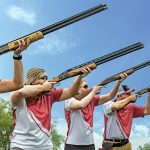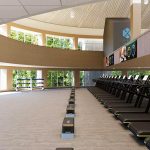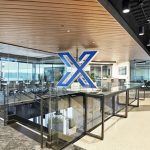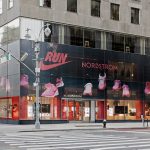“Tis the season for investor conferences as analysts look for something, anything, that will give them an edge as most industry vendors close their calendar year and retailers finish up their 2003 sales cycle. The last week saw the Super Show Financial Day in Orlando, the SG Cowen event in New York City and the Integrated Corporate Relations ICRXchange, held in Huntington Beach, CA ,all occur over a six day period.
The outline below is an amalgam of the various conferences and should give our readers a general overview of key insights from some of the top companies. For more detail from the Super Show Financial Day program, see last weeks report (SEW_0402). The ICR event was clearly the most heavily attended with over 700 financial analysts, fund managers and media types taking the opportunity to learn more about many of industrys public companies.
Brown Shoe Corp. CEO Ron Fromm shared some preliminary plans for the Bass Shoe acquisition. While declining to give guidance for sales, BWS says it will leverage its strong department store business in growing the estimated $75 million company. Fromm expects to achieve “the same turnover metrics” at Bass that they achieved at Famous Footwear. Fromm also noted that their exposure at Meldisco was “minimal”, limited to some licensed kids shoes.
BWS believes that Famous Footwear has the potential for 400-600 more stores. Fromm stated that traffic at FF was improving “month-over-month”. For 2004, 25% of branded athletic will be exclusive product at FF, including Visible Air styles from Nike at $50 to $80 retail price points.
Brunswick Corp. has raised its guidance for the fourth quarter and full year 2003, now estimating Q4 earnings per share to be in the 40 cents to 43 cents range, up from previous guidance of 28 cents to 33 cents per share.
Full year EPS is now seen in the $1.62 to $1.65 per diluted share range, up from previous estimates of $1.50 to $1.55 for the year.
Full-year estimates exclude a litigation charge of 18 cents a share taken in the first quarter. Analysts, on average, had expected the company to deliver to earn 32 cents a share in the fourth quarter and $1.52 a share for the year.
The company said continued strong sales and earnings growth from its Marine Engine, Boat, Fitness and Bowling & Billiards segments, along with the foreign exchange impact of the weakening U.S. dollar and a lower effective tax rate, were the primary drivers behind the better-than-expected results for the quarter.
BC shares are trading at their highest level in more than five years, closing at $35.55 on Friday, up 12.5% for the week.
Deckers CEO Doug Otto spoke extensively about the white-hot Ugg product, estimating that the company has sold 600,000 pair of the sheepskin product in 2003.
Otto described the 2004 backlog as “unprecedented” and “heightened demand” for the Ugg product line has prompted the company to raise its fiscal 2004 sales guidance to a range of $133 million to $140 million, versus its previous guidance of $126 million to $132 million.
Otto noted that they have made arrangements for enough sheepskin to exceed their guidance of $45 million for Ugg in 2004. DECK now sees 2004 sales of the Teva brand to be in the $82 million to $84 million range and Simple to be $9 million to $11 million.
He also described the plans for “Simple Sheep” a lower price-point Ugg-like style offered out of the “moderate division”, Simple. DECK tested the styles at Famous Footwear last year to strong results. Otto also said that DECK was prepared to do first-cost business on the hot sheepskin boot.
DECK is now raising its diluted EPS guidance for fiscal 2004 to a range of $1.02 to $1.06 a share, versus its previous guidance of 92 cents to 96 cents. The analyst consensus estimate was 96 cents a share.
Deckers shares jumped 29.4% for the week to close at $22.90 on Friday. You may remember that one analyst downgraded the stock the previous week (SEW_0402) based on his belief that “the Ugg phenomenon had all the hallmarks of a fad”, sending shares down almost 18%. Visionary, eh?
Foot Locker, Inc. shares hit a five-year high after president and CEO Matt Serra indicated that fiscal fourth-quarter-to-date sales were “running at the high end” of previous expectations, indicating that comparable-store sales trends, which had strengthened significantly in late December, “have continued to accelerate during January”.
Serra also said that the strength in Q4 comps had come from the Foot Locker stores in the U.S. and Europe as well as the “Footlocker.com Internet channels”.
Mr. Serra confirmed that Q4 comp store sales should increase in the 4% to 6% range and raised earnings guidance from continuing operations to 41 cents to 45 cents per share, representing at least a 24% gain versus the 33 cents in the year-ago period and up significantly from previous guidance of 37 cents a share.
Key objectives for the coming years include a target of sales per gross square foot of $350 and achieving an 8.5% operating profit margin, while maintaining strong positive cash flow.
Foot Locker shares were up 7.1% for the week to close at $25.20 on Friday.
Huffy Corporation sees Q4 sales in line with expectations, but now estimates that the loss from continuing operations for the quarter will be “higher than previously indicated”. Sales for the quarter are still expected in the $120 million to $125 million range. The higher Q4 loss at HUF may also result in a “modest loss” from continuing operations for the full year.
The company cited “lower gross margins in the basketball backboard segment, action sport and in-line skate segment, and higher than anticipated expense levels at Gen-X” for the warning on earnings.
HUF said they are in discussion with their lenders, led by Congress Financial Corporation, in attempts to amend “certain financial covenants” in their loan agreement to “reflect lower sales and earnings projections”. The company said it recently negotiated an amendment to its revolving loan agreement that revised financial covenants to reflect lower projections, a phased decrease of the loan limit under the facility consistent with its initiatives to reduce working capital and confirmation that the lenders will not test compliance with certain existing financial covenants at Dec. 31, 2003.
Huffy also indicated that it expects full year 2004 earnings to be 22 cents to 27 cents per share on sales in the $450 million to $460 million range.
HUF shares fell 6.3% for the week to close at $5.03 on Friday.
K2 Inc. CEO Dick Heckman remains committed to becoming the “Nike of hard goods” by internal leveraged growth and by future acquisition. He said he expects future acquisitions to be with in their current platforms of team sports, fishing, marine/outdoor, winter/summer and paintball. This apparently rules out expanding into golf or tennis, at least for now.
KTO shares were up 8.4% for the week, closing at $17.20 on Friday.
Editors Note — Look for a full report in next weeks issue when SEW goes “One-on-One” with K2s chairman and CEO, Dick Heckman.
Oakley CEO Link Newcombe described a “challenging year” for sunglasses in 2003. He stated that new styles make up 25% of total sunglass revenue and that the 2003 offerings did not perform to plan. Non-sunglass categories now make up 25% of the total business and grew at a rate nearly double that of sunglasses.
Newcombe pointed out that footwear has been “the most challenging” of the non-sunglass categories. For 2004, Oakley is launching “selective distribution” sunglass styles aimed specifically at the surf/snow/skate market. One major success in OOs portfolio has been their own retail stores, which now comprise “more than 25%” of U.S. sunglass sales, with retail locations throwing off $450 per sq. foot in sales, with “high vertical margin”.
Saucony CFO/COO Mike Umana presented the Saucony story, noting that 60% of the companys U.S. sales were to women, and were about 50% internationally. He said that growth this year in footwear would come from the mid price $60 to $75 footwear, while both technical running and classic styles would be down. The bulk of their growth is now reportedly coming from independents, with little penetration at the mall. He thought their share growth was coming out of Asics and New Balance.
Saucony now expects net sales for the fourth quarter to be approximately $31 million and earnings per share to be in the range of 14 cents to 17 cents, up from its guidance in late October of approximately $30 million in sales and EPS in the 8 cents to 10 cents range. Full year 2003 EPS is now seen between $1.25 and $1.28 per share versus the previous guidance of $1.19 to $1.21 a share.
SNCYA shares increased 10.1% for the week to close at $18.95, while SCNYB shares jumped 21.7%.
Shoe Carnival CEO Mark Lemond described the key initiative at SCVL for 2004: limit store growth to filling into existing markets, with store count growing around 10%; change the ad message and mix to address newer markets, while lowering ad spend in established markets; execute shift in product mix to more dressy womens styles and to athletic overall; and develop a better definition of target customer.
SCVL shares were up 6.3%, closing at $16.00 Friday.
The Sports Authority noted that they currently bought from 1,500 vendors. CEO Doug Morton said that he thought they could reduce that list to 900 to 1,000 vendors. Morton also said that the combined business breaks down as 27% apparel, 23% footwear; 50% hard goods.
Morton indicated that 80 stores will have The North Face going forward and that “more will Columbia”. He had shops for those brands in 40 stores in 2003 and sees “more in 2004”. He said that “shops dont make sense in Florida”, but that they would certainly carry tees and shorts in those locations. The companys private label Estero brand is now the #1 selling soccer brand in Florida.
Morton sees “flat” comps in Q4 versus last years 3.2% decline at Gart and a 4.7% comp sales drop at the old TSA stores. Total sales for 2004 are expected to be $2.6 billion on 2.0% same-store sales growth.
Inventory per sq. ft is expected to be $ 39.96 in 2004, down from $41.15 in 2003 and $51.31 in 1998. TSAs reported Gross Margin has risen 210 basis points from 1998 to the first half of 2003. Morton said that 48% of customers through the door are women.
TSA shares were up 6.3% for the week, closing at $40.92 on Friday.
The Sportsman's Guide did not present at the aforementioned conferences, but they did report guidance for the fourth quarter, with EPS estimated between 70 cents and 72 cents on total sales in the $71 million to $72 million range.
Fourth quarter 2002 earnings per share were 53 cents on sales of $66.3 million and analysts were expecting 63 cents a share this year.
Internet-related sales continue to surge and were approximately 36% of sales for the quarter, compared to just under 30% for the year-ago period.
Full year 2003 earnings are seen in the $1.14 to $1.16 range on sales between $194 million and $195 million. Analysts were looking for $1.07 per share on $194.5 million in sales.
SGDE shares jumped 15.6% last week, closing at $20.00 on Friday.
Vans, Inc. CEO Gary Schoenfeld presented at ICR and also sat for an exclusive interview at the ASR show. (See ASR report)
Based on current trends, Vans is raising its previous earnings guidance for its fiscal third quarter as the business the last few weeks accelerated “substantially” above its expectations.
VANS now sees fiscal Q3 earnings of 21 cents to 23 cents a share, up from the pre-holiday estimate of 17 cents to 19 cents a share. Excluding skate parks to be closed, Vans sees Q3 earnings of 24 cents to 26 cents a share. Vans lost 51 cents per share in Q3 LY.
Same store-sales for owned-retail are now ahead by more than 15% for the first six weeks of the quarter, with men's, girl's and apparel all performing well. The increase, along with “strengthening” in the U.S. wholesale business, was cited for the improved guidance.
For its fiscal year, Vans now expects earnings of 38 cents to 46 cents a share, or 60 cents to 64 cents a share excluding the skateparks, versus a loss of 57 cents a share, excluding charges, in fiscal 2003.
VANS shares were up 13.8% for the week to close at $12.38 o Friday.
Wolverine World Wide cited Europe as a key growth area, believing that region has the potential to be a bigger market than the U.S.
CEO Tim ODonovan cited the success of their “shop-in-shop” program for Merrell, which totaled 60 in 2003. He described “phenomenal results” for the shops, with increases from 50% to “several hundred percent”.
ODonovan sees the potential for more than 300 “shop-in-shops”. In addition they plan to spend more marketing dollars on POS merchandising.
WWW shares dipped 1.8% for the week.













